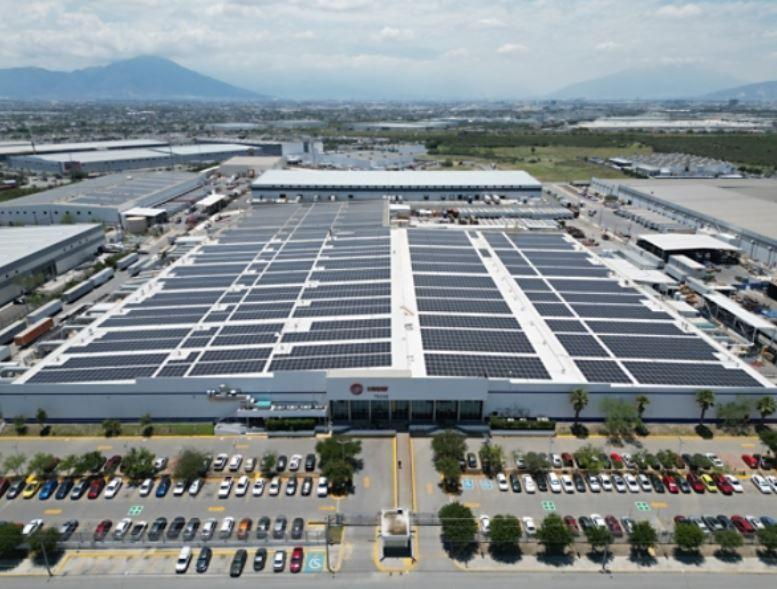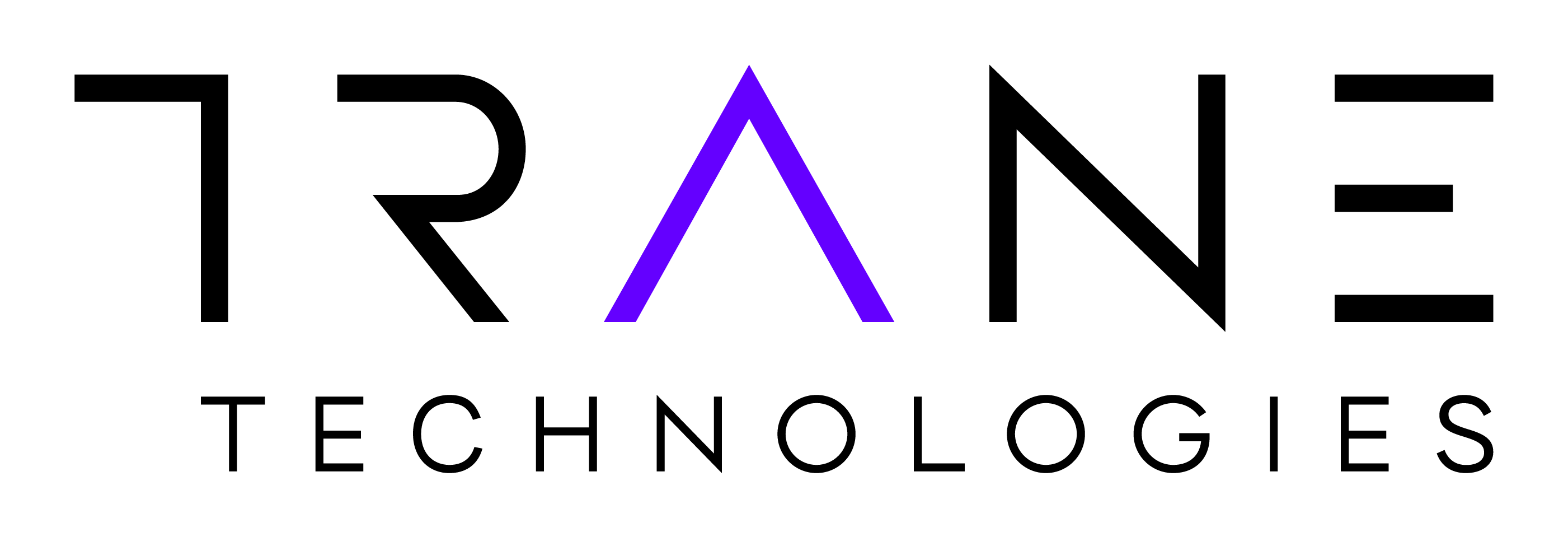Sustainability in Action: Monterrey Facility Is Leading by Example in Energy and Waste Management
Our team at Trane Monterrey is taking bold action to lead the way in responsible operations

We’re leading by example through responsible operations, reimagining our systems and taking action to have a restorative impact on the environment.
The opportunity: Our manufacturing facility in Monterrey, Mexico, produces Trane heating, cooling and ventilation products, including HVAC units and components. The Monterrey region is facing ever increasing water and energy shortages, presenting a significant operational challenge and serving as a reminder of the importance of our 2030 Sustainability Commitments.
The solutions: Focus on absolute energy consumption reduction and becoming net positive with water use by:
- developing a rainwater recovery system to supplement ongoing condensed water collection
- installing a wastewater treatment facility
- installing solar-powered rooftop photovoltaic battery storage systems across the site’s three plants: the largest project of isolated supply in Mexico
Sustainability outcomes:
- anticipated annual clean energy production of 10,000 MWh, reducing energy consumption by an additional 45%
- anticipated annual net positive water consumption of an estimated 1,053 m3
- ISO 50001, 18001, 14001, 9001 and U.S. Department of Energy Superior Energy Performance certifications
As extreme drought and rising temperatures result in increasing restrictions on water and energy use in Monterrey City, Mexico, the team at our Trane Monterrey facility is leading the way to create sustainable solutions for its operations.
Working across a three-plant worksite that spans over 538,000 square feet under one roof, the Monterrey site has long been committed to responsible operations. In 2015, the plants were chosen as a site for a Georgia Tech pilot program in energy management system implementation under a Mexico and US Departments of Energy partnership. That momentum, along with our initial climate commitments, propelled the team into dedicated strategic action, significantly reducing the site’s overall energy consumption. By 2018, the Monterrey facility had received ISO 50001 and Superior Energy Performance (SEP) certifications.
Today, guided by Trane Technologies’ 2030 Sustainability Commitments and pledge to reach net-zero by 2050, the Monterrey site’s 1000+ employees are working together in pursuit of absolute energy consumption reduction. And with increasing water vulnerability in their region, the team is also taking bold action to become net positive in water consumption.
Taking the next right step
The Monterrey site’s responsible energy management relies on continuous improvement, strategic project development and implementation and company culture. To reduce energy waste, the team has invested in significant upgrades and replacements in leak testers, illumination technology, roofing and air compressors. Additionally, 5-minute interval data reports monitor consumption behaviors and energy performance, allowing for continual improvement of the existing systems.
But meeting the superior energy performance standard was not enough for an organization committed to leading the way. In an ambitious step towards net-zero, the team recently implemented their largest energy project to date: the installation of photovoltaic panels to generate clean energy on site.
Part of an $18 million plant expansion investment, the newly installed solar panel array is the largest project of isolated battery-powered supply in Mexico. In total, close to 10,000 panels have been installed across Monterrey’s three plants, with plans to be producing energy in 2024. Once operational, the panels will supply close to 10,000 MWh of energy annually, approximately 45% of the total energy consumed by the three plants each year.
Sustainability is the strategy
Meanwhile, the team is rapidly moving forward on another bold strategic project, this time to address the growing water crisis in northern Mexico. Already considered a region of high-water vulnerability, Monterrey’s annual precipitation will likely decrease by roughly 18% by 2030, according to experts’ predictions.
Water recovery is an ongoing strategy in the team’s sustainability efforts. Nearly 17,000 m³ of condensed water have been collected from the plants’ HVAC units since 2016. As a follow-on measure, the team installed in 2021 a rainwater harvesting system to supplement those efforts. Together, the rainwater and condensed water systems collect approximately 6,000 m³ per year.
To realize a net positive operation for water consumption, the site embraced the next tier of water use evolution to a different scale. That’s why the team has spent the past year planning for the installation of a biological sanitary wastewater treatment plant on site. The plant receives wastewater and sanitary drainage from the site’s restrooms and cafeteria. During treatment, aerobic and anaerobic biological processes remove biodegradable, soluble, organic and nutrient substances, and colloids from the wastewater. The recycled water can then be used in on-site business operations.
Product manufacturing across the three plants requires the consumption of approximately 6,190 m³ of water annually. The proposed water treatment plant would produce approximately 7,248 m³ of recycled water, allowing all production to be net positive for water consumption and leading the way to Trane Technologies’ 2030 net positive water commitments.
“We are looking for continuity in the business, which is why a Biological Wastewater Treatment Plant was the next right step in addressing the scarcity of this vital resource,” explained Rigoberto Mena, Maintenance and Facilities manager for Trane Monterrey. “Besides our condensed and rainwater recovery systems that save up to 30% of our consumption for our processes we needed a solution that would bring us closer to our net-zero goal.”
The benefits of the wastewater treatment project extend far beyond significant environmental impact: By lessening the water demands of its site, the team also reduces the economic risks of water supply cut-offs or ecological taxes and fines. Preserving clean water for the people of Monterrey strengthens the workforce and uplifts the local community. And the surplus of recycled wastewater can even be donated back to the government for redistribution, impacting the region at large.
Turning ambition into action
Leading by example in sustainability doesn’t happen overnight. Rigoberto Mena, maintenance and facilities manager for Trane Monterrey, credits much of the team’s success to the company’s annual five-year strategic planning process. Using the Hoshin Kanri method, they set out three- and five-year objectives, development and action plans and metrics, all in pursuit of contributing to Trane Technologies’ 2030 Sustainability Commitments.
Small, daily choices also contribute to a culture of sustainability. Visual reminders and ongoing discussions constantly remind employees of ideal energy-saving behaviors. And systems like the Energy Suggestions Mailbox, built to encourage and capture employee’s ideas and solutions, underscore the value of teamwork and shared purpose. According to Tania Guerrero, supervisor in Control Engineering and Strategic Projects, many of the most effective ideas have emerged directly from Rigoberto and his maintenance team.
“Rigoberto Mena has been a pioneer in the Monterrey plant with the establishment of our energy management system in 2016,” Tania said. “We are proud to say that thanks to all of the crucial work from the maintenance team with water saving and energy efficiency projects and his leadership of our culture of sustainability, we know we have made an impact on our progress toward our sustainability commitments and our net-zero objectives.”
Not surprisingly, the team has other big projects and goals on the horizon, including LEED Certification, converting air handlers to variable-speed, installing ice storage systems, cogeneration and Tesla batteries for energy storage from the new solar panels, among others.
With a collaborative culture of possibility, it’s clear that the Monterrey team will continue to lead the way in meeting global challenges with bold thinking, strategic commitments and decisive action, transforming the industry in ways that are better for business – and the planet.

